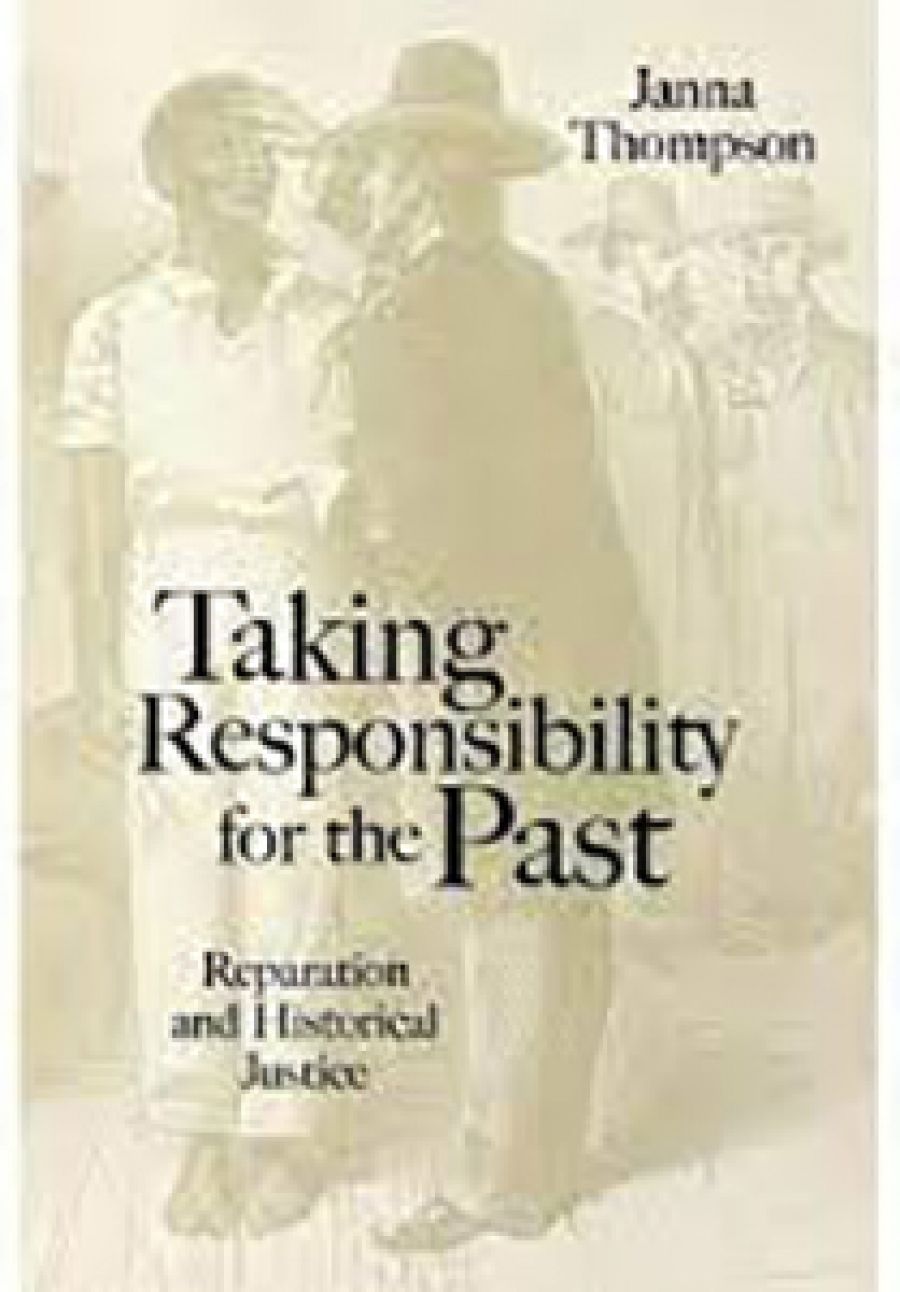
- Free Article: No
- Contents Category: Indigenous Studies
- Review Article: Yes
- Article Title: A Sorry Challenge
- Online Only: No
- Custom Highlight Text:
Those of us who walk across bridges in support of reconciliation, and sign Sorry Day books, do so because we feel an obligation to recognise and apologise for the destructive legacy of past practices. Sometimes we can speak directly to those people who were taken away; often we are addressing their descendants. As the prime minister continues to point out, many of us are apologising for something for which we are not individually responsible. So what is the source of this sense of obligation, and how can saying sorry make a difference?
- Book 1 Title: Taking Responsibility for the Past
- Book 1 Subtitle: Reparation and historical justice
- Book 1 Biblio: Polity, $58.25 pb, 194 pp
- Book 1 Readings Link: https://www.booktopia.com.au/taking-responsibility-for-the-past-janna-thompson/book/9780745628851.html
This book gives us new ways of thinking about such questions. In a tight and coherent argument, philosopher Janna Thompson develops a moral (as opposed to a legal) theory of reparative justice that helps us understand why we might have obligations to remedy the wrongs of our predecessors. Thompson draws on a number of examples, including white Australia’s obligations towards members of the Stolen Generations, indigenous claims to land in Australia and elsewhere, and claims for compensation for victims of slavery and the Holocaust. Her argument, in a nutshell, is that we owe it to each other to remedy historical injustices because only then can we expect that our own experience of injustice will be remedied by future generations.
At the heart of her argument is an understanding of society as ‘transgenerational’. She cites Edmund Burke’s definition of political society as ‘a partnership between those who are living, those who are dead, and those yet to be born’. This is a moral partnership, based on the mutual trust and reliance between peoples and nations that commitments will be honoured across generations, and that historical injustices against nations and family lines will be remedied.
The first half of the book looks at obligations between nations – not nation states, but what Thompson defines as self-governing societies with the power to make laws for themselves and to make agreements with other societies. Thompson takes as case studies the Māori and the Cherokee nations, both of which entered into agreements with their British colonisers. In discussing reparation for breaches of those agreements, Thompson presents a subtle and well-argued theory of how to balance historical claims for reparation with present rights (for example, to land), and looks at how the passage of time might affect such claims.
More could have been said, however, about those peoples, such as Australia’s indigenous people, who have no formal agreement on which to base their reparative claims. While Thompson assumes their status as a nation for the purpose of her argument, greater exploration of the implications of this historical difference – both for their claims, and for her own argument – would have been welcome.
The second part of the book looks at those who have claims for reparation based on wrongs suffered by their individual forebears, as opposed to claims based on membership of a nation. Thompson’s analysis of the Stolen Generations is a particularly clear analysis of an issue that has become mired in ideological sludge. She avoids the question of whether the removal policies amounted to genocide. Instead, she contends that the problem with many of the arguments about the moral basis of the removal policies is that they focus on the impact on individuals rather than the impact on family lines.
Removal of indigenous children broke the connection of parents with the future, prevented children from acquiring a cultural, political and religious inheritance, and destroyed the possibility of meaningful relationships between generations by precluding the transfer of language and culture. Thompson argues that those removed, and their descendants, have a legitimate moral claim to reparation on the basis of this damage to family lines. Her approach allows us to move beyond distasteful, abstracted debates that seek to quantify the harm suffered by individuals according to opportunities lost and gained as a result of their removal. Her analysis also helps clarify our moral duty to make reparation: it arises because we are citizens of a nation that has transgenerational historical obligations to remedy injustice. And, like all citizenship obligations, we have this obligation regardless of whether we, or our present leaders, were personally involved.
This is a book deeply concerned with morality, yet it successfully avoids any hint of moralism. Similarly, the argument is without political baggage, while at the same time being alive to the political context in which reparative claims are made. Thompson is rigorous and precise in defining her concepts. Her argument is succinct and pleasingly logical, as she anticipates and addresses the reader’s questions, and acknowledges the limits of her argument.
Ultimately, Thompson is concerned to find a workable solution to the impasses presented by conventional legal and rights-based analyses of historical injustice. To this end, the aim of her model of reparative justice is reconciliation rather than the traditional legal focus on putting people back in the position they were in before the wrong was committed. For Thompson, reconciliation is not a platitudinous, well-meaning aspiration, but a concrete end-goal. Hence, her conclusion that there is no moral basis for reparative claims if a harmonious relationship now exists between the nations or peoples concerned, even if historical injustice remains unremedied in a traditional sense. This will be a challenging conclusion for many. At the same time, it does offer an opportunity to move forward. And by linking justice to reconciliation or reparation, we can start to see how symbolic gestures, such as an apology to those affected by the removal of indigenous children, might be a significant – and possibly sufficient – form of reparation if it can heal broken relationships.


Comments powered by CComment